Moringa for Brain Health: Why We Believe in Its Promise (and Why You Might Too)
Moringa for Brain Health: Natural Support for Focus, Memory & Calm
Here’s what current science suggests — in clear, honest language.
1. Introduction — Why Brain Health Matters Today
It’s easy to feel overwhelmed. Between screens, stress, and shifting sleep patterns, many of us struggle to keep our minds sharp and centered. What if nature could offer a helping hand — not a miracle cure, but a gentle, supportive ally?
In this post, we dive into how Moringa oleifera (the “Miracle Tree”) is being studied for brain health: its mechanisms, the evidence so far, and how you might use it (safely) in your daily life.
2. What Does “Brain Health” Really Mean?
Before exploring botanicals, it's helpful to understand some fundamentals of cognitive health:
-
Oxidative stress occurs when free radicals overwhelm our cells, damaging lipids, proteins, and DNA.
-
Neuroinflammation — chronic inflammation in brain tissue, often triggered by stress, toxins, or poor diet.
-
Neurotransmitter balance & signaling — proper levels and communication of molecules like acetylcholine, dopamine, glutamate, etc.
-
Neuroplasticity & resilience — the brain’s capacity to form new neural connections and bounce back from insults.
Over time, imbalances in these systems can lead to mental fatigue, “brain fog,” memory lapses, or difficulty sustaining focus. In the wellness world, we often look for botanicals that may help support (not replace) these systems.
3. The Botanical Basis: Why Moringa Stands Out
When selecting herbs with brain support potential, you want ones rich in bioactive compounds with plausible neuroprotective actions. Moringa oleifera fits several key criteria:
-
Its leaves, seeds, and bark contain flavonoids and phenolic acids (e.g. quercetin, kaempferol, chlorogenic acid) known for antioxidant and anti-inflammatory action. PubMed Central
-
It also contains isothiocyanates (such as moringin), which are under investigation for their ability to modulate inflammation in neural tissues.
-
An analysis of 120 reports shows that in many parts of the Moringa plant (leaves, seeds, bark), phytochemicals like alkaloids, terpenoids, glycosides, and flavonoids correlate strongly with neuroprotective and antioxidant effects. ScienceDirect
-
Traditional uses of Moringa for vitality and wellness (in various systems) support its inclusion in contemporary botanical research. PubMed Central+1
Because of that chemical richness, Moringa presents a compelling hypothesis: if its compounds reach neural tissue (or exert systemic support), they might help buffer oxidative damage, calm inflammation, or support healthy signaling in the brain.
4. What the Science Shows (Preclinical & Early Studies)
A. In Vitro / Cell Studies
In lab settings, Moringa extracts have shown:
-
Increased cell survival under oxidative stress challenges
-
Promotion of neurite outgrowth (more branching, potentially better connectivity)
-
Modulation of antioxidant enzyme systems and reduced reactive oxygen species (ROS)
-
Regulation of pathways involved in apoptosis (programmed cell death) and mitochondrial integrity
These experiments provide mechanistic clues — but they remain early steps, not proof in humans.
B. Animal / In Vivo Studies
Animal studies give us greater context about how Moringa behaves in living systems:
-
Memory & neurodegeneration models: In a study using ICV-AF64A damage (a chemical that impairs cholinergic neurons) in rats, Moringa leaf extract improved spatial memory, reduced oxidative stress, and enhanced enzymatic antioxidants (e.g. SOD, CAT) in hippocampal regions. yguamoringa.com
-
Form comparison – seed oil vs leaf extract: In mice with induced memory impairment, Moringa seed oil (MOO) outperformed leaf extracts (MOE) in mitigating deficits—suggesting formulation and bioavailability matter. Frontiers
-
Protection from ischemic damage: In rodent models of focal ischemic stroke, Moringa extract showed protective effects against brain damage and oxidative stress markers. PubMed Central
-
Memory impairment reversal: In ketamine-induced memory impairment in Wistar rats (a model disrupting NMDA receptor signaling), Moringa prevented deficits in working memory tasks. BioMed Central
-
Mitigating neurotoxicity: In rat models exposed to the pesticide acetamiprid (which induces neural apoptosis), Moringa seed extract reduced neuron death and markers of oxidative stress. ResearchGate
C. Limitations, Gaps & Caution
-
Safety & interactions: Long-term safety, herb-drug interactions, and population-specific risks (pregnancy, disease states) are underexplored.
-
Overinterpretation risk: Positive outcomes in animals or cells should not be taken as proven human benefit — they are promising leads, not guarantees.
5. From Research to Real Life: Practical Use & Considerations
How You Might Use Moringa
-
Forms: Powder (leaf or blends), teas, extracts, seed oil. Each has trade-offs in potency, absorption, and ease of use.
-
Suggested starting dose (not medical advice): Many users begin with ½ to 1 teaspoon of leaf powder daily. Botanical formulations often use higher concentrations.
-
Timeline: Botanical support is gradual. Noticeable effects (if any) may emerge over weeks to months.
-
Synergy matters: Sleep, hydration, movement, stress management — these foundational habits amplify botanical support.
-
Absorption tips: Taking Moringa with healthy fats (e.g. nut butter, avocado, coconut milk) can aid uptake of fat-soluble compounds.
-
Split dosing: Some may prefer dividing the dose (morning + afternoon) to maintain steady levels.
Safety, Interactions & Best Practices
-
Human evidence is limited: Use cautious optimism.
-
Medication interactions: Moringa may affect blood sugar, blood pressure, and interact with medications (antidiabetic, antihypertensive, anticoagulants).
-
Caution for vulnerable populations: Avoid high doses during pregnancy, breastfeeding, or if you have hormonal sensitivities unless cleared by a clinician.
-
Titrate slowly: Start with a small amount and observe your body’s response — digestion, mood, cognition, energy.
6. Why We Formulated a Moringa + Adaptogen Blend
When designing botanical formulations for real-world conditions, we considered that:
-
Moringa addresses oxidative stress and inflammatory balance, but life’s stressors (mental demand, emotional load, circadian disruption) impose additional burdens on the nervous system.
-
Adaptogens like Ashwagandha help support stress-response systems (e.g. HPA axis) and buffer cortisol fluctuations.
-
Evidence for Ashwagandha in human cognition is stronger than for Moringa:
-
A 90-day sustained-release Ashwagandha study found improvements in memory recall, reduced cognitive errors, improved sleep, and lower stress. PubMed Central
-
A 30-day trial (225 mg) showed enhancements in memory, executive function, vigilance, and reduced tension and fatigue. MDPI
-
-
Pairing Moringa + Ashwagandha allows complementary pathways — one focuses on antioxidant/inflammatory balance, the other on stress buffering and cognitive modulation.
7. How to Integrate Into Daily Life
Here are simple ways to weave this botanical support into your routine:
| Time | Use Suggestion | Notes |
|---|---|---|
| Morning | Stir into a smoothie, oats, or warm milk | With healthy fat + protein for better absorption |
| Midday | Add to yogurt, bowl, or tea | Gentle lift during afternoon dip |
| Evening | Take earlier in the evening | Avoid too late if sensitive to adaptogens |
| Mindful pairings | Breath work, short walk, journaling | Botanic + habit = stronger effect |
Additional tips:
-
Track your mental clarity, focus, and mood over several weeks rather than expecting immediate change.
-
Cycle usage if needed (e.g. 5 days on, 2 days off) to test effects.
-
Combine with other brain-supportive habits, such as screen breaks, low glycemic nutrition, and rest.
8. Summary & Key Takeaways
-
Promise, not promises: Moringa’s phytochemicals (flavonoids, isothiocyanates, phenolics) are biologically plausible for supporting brain health.
-
Preclinical support is solid: In vitro and animal models consistently show neuroprotection, improved memory, and reductions in oxidative/inflammatory stress.
-
Human-level evidence remains minimal: Clinical trials focused specifically on Moringa’s effect on cognition are lacking.
-
Formulation and delivery matter: Seed oil, extracts vs leaf powder — how you take it may change efficacy.
-
Blending with adaptogens can bridge gaps: Adding an adaptogen like Ashwagandha may support stress buffering and executive cognition pathways.
-
Use wisely & patiently: Start gently, pair with lifestyle foundations, monitor your response, and respect individual variation.
We see Moringa not as a magic pill, but as a thoughtful botanical ally — one more instrument in your well-rounded wellness toolbox.
9. References & Further Reading
-
A Review on the Neuroprotective Effect of Moringa oleifera — a comprehensive discussion of antioxidant, anti-inflammatory, and neurotransmitter modulation properties. PubMed Central
-
An insight into the neuroprotective and anti-neuroinflammatory effects of M. oleifera — mechanisms, compounds, and gaps in knowledge. PubMed Central
-
Effects of Moringa oleifera in Two Independent Formulations — Comparison of Seed Oil and Leaf Extract on Memory Impairment in Animal Models. Frontiers
-
Comparative Neuroprotective Effects of Moringa oleifera Seed Oil — Roles of MOO vs MOE in Brain Aging and Signaling. PubMed Central
-
Moringa oleifera Mitigates Memory Impairment and Neurodegeneration — spatial memory study in rats with hippocampal measurements. PubMed Central+1
-
Efficacy and Safety of Ashwagandha Root Extract on Cognitive Function — human trial showing memory and stress outcome improvements. PubMed Central
-
Acute and Repeated Ashwagandha Supplementation Improves Cognitive Function and Mood — human trial on executive function, memory, and well-being. MDPI+1
-
Cerebroprotective Effect of Moringa oleifera against Focal Ischemic Injury — neuroprotection in stroke model in rats. PubMed Central
-
Moringa oleifera Leaf Extract Improves Cognitive Function in Rat Model — recent study adding support to cognitive benefit. PubMed Central
*This statement has not been evaluated by the Food and Drug Administration. This product is not intended to diagnose, treat, cure, or prevent any disease.

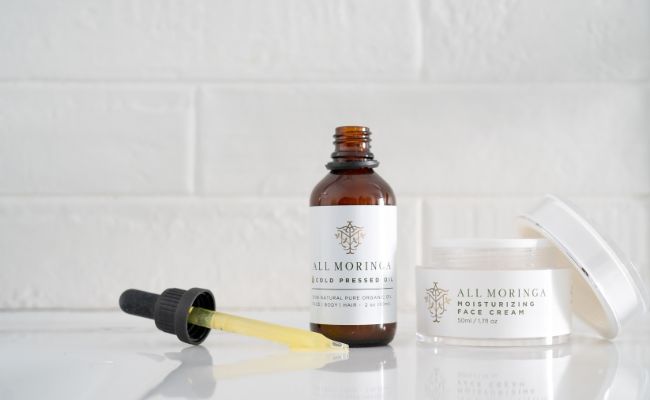
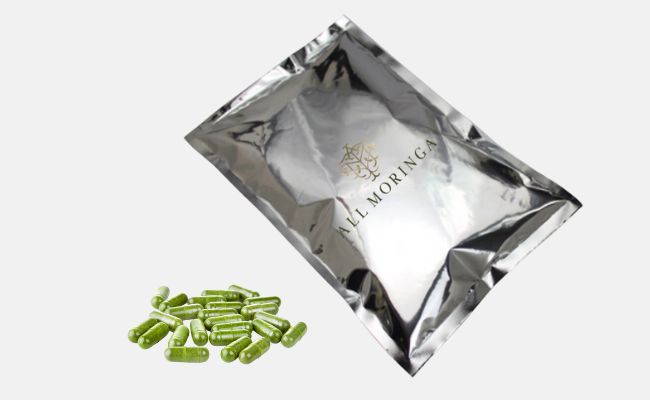
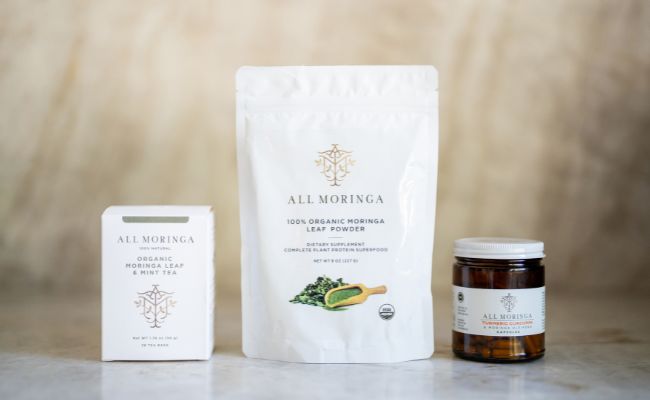
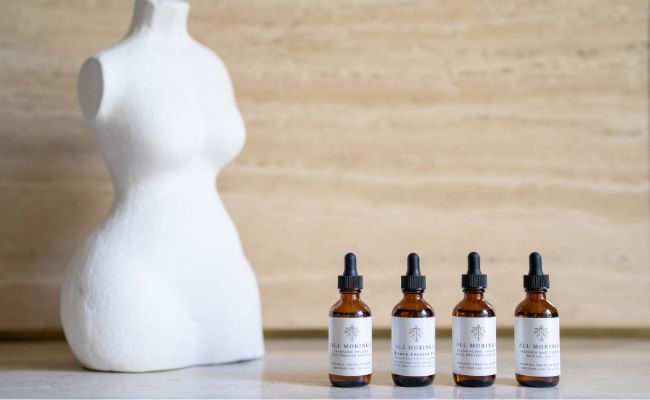
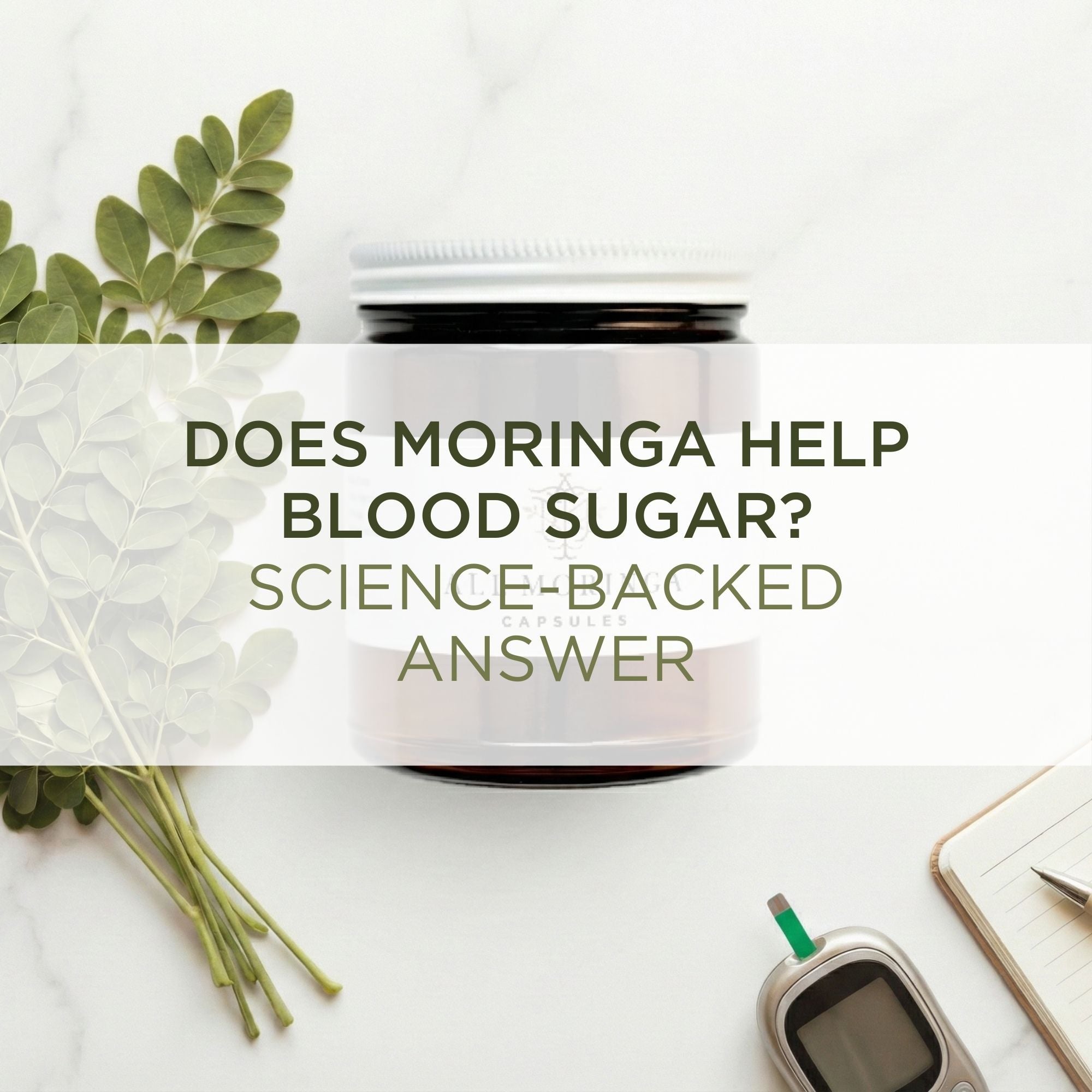

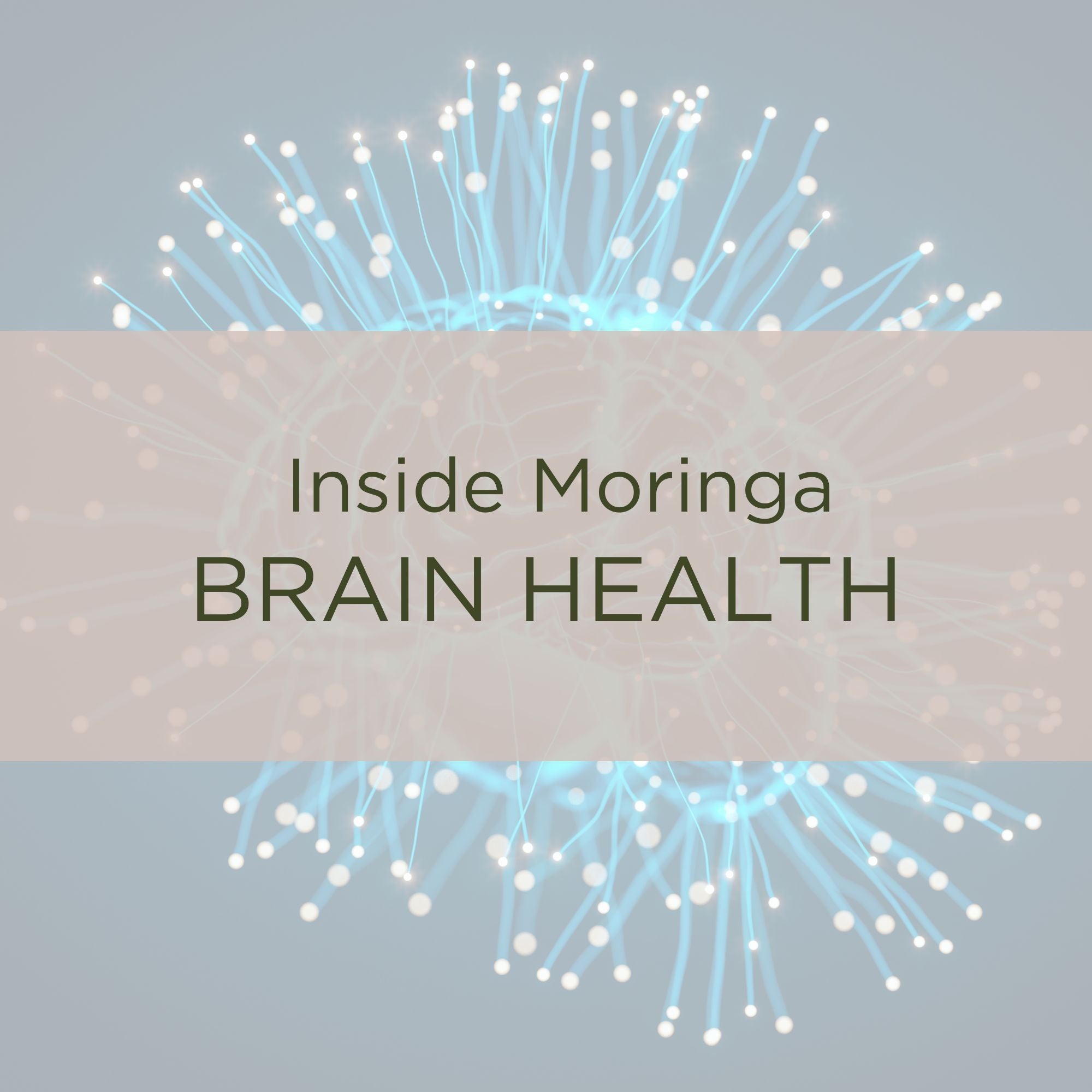
Leave a comment
This site is protected by hCaptcha and the hCaptcha Privacy Policy and Terms of Service apply.